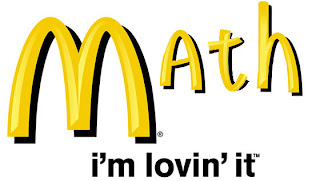Commodify your Mathematics?
Here's an interesting article about Tom Farber, a high school Calculus teacher from San Diego who is fighting tough economic times and cutbacks in education spending in a rather novel way - he's selling ad space on math tests.
The goal here certainly doesn't seem to be the development of a second income. Many teachers report having to spend money out of their own pockets for school supplies - in this case, Mr. Farber is using the money to help cover the copying costs associated with making tests and practice exams to help students prepare for the APs. His intentions certainly seem benevolent, but are his actions as innocent?
It seems like the advertising is fairly non-intrusive. There are no graphics, and the ads run on the bottom of the page. The fact that a good chunk of the ad space was bought by parents who wanted to run supportive messages certainly makes this easier to swallow as well.
The article suggests that the main criticism with Mr. Farber's plan is that it is a slippery slope: if he's successful in using advertising to supplement a dwindling state budget, couldn't the state then begin expecting advertising revenue to be used as a way to make ends meet? An important question, to be sure, but given that this seems to be an isolated incident, I think there are perhaps some more pressing questions that this raises.
Some that initially come to mind: how intrusive is too intrusive? Should advertisers be able to sponsor specific problems? It's unlikely parents would be enthusiastic about McDonalds sponsoring their third grader's test (If you have 4 boxes of 6 piece McNuggets, how many McNuggets do you have?), but what about advertisers which are less morally questionable? Should Scholastic books be able to sponsor individual problems?
The fact that all of Mr. Farber's advertising came from parents and local businessness certainly makes this endeavor seem more innocuous than it would if his tests were being sponsored by Starbuck's or Burger King. But is it really more ok to advertise on a test if you restrict to local businesses? Should local businesses be able to sponsor individual problems? Is it ethical for the local comic book store to sponsor a word problem that asks students to investigate how much money the store needs to make in a month to avoid closing? Is it more or less ethical to do this if the numbers are accurate?
These questions may seem a bit esoteric, but with all the buzz about the economic crisis, and California's economic crisis in particuclar, these questions may become more important if teachers are pushed to look for creative solutions to patch up budget shortfalls. That is, if all the teachers don't get fired first.
On the other hand, I guess you could look at it this way: people have been using math in their advertising for years, and math hasn't been able to reap the benefits. Maybe now it's time to start turning the tables.
Psst ... did you know I have a brand new website full of interactive stories? You can check it out here!


